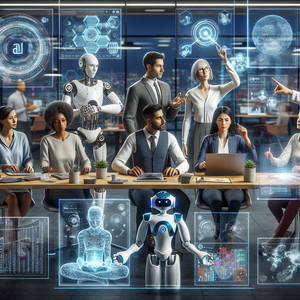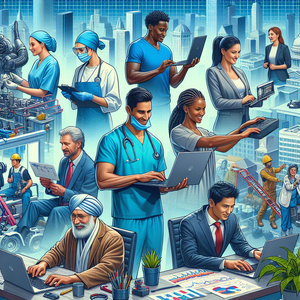
15 Future-Proof Careers: Skills and Opportunities Shaping the Workforce of 2030
The world of work is undergoing a seismic shift, influenced by rapid technological advancements, changing societal needs, and an increased emphasis on lifelong learning. By 2030, up to 1 billion workers may need reskilling to remain competitive in a job market transformed by artificial intelligence (AI), automation, and digital innovation. According to the World Economic Forum’s Future of Jobs report, industries such as AI, FinTech, healthcare, and sustainability are poised to experience exponential growth, while many traditional roles are increasingly at risk of automation. This duality highlights a crucial truth: adaptability and skill diversification will be the cornerstones of career resilience in the coming decades. However, the future isn’t solely about technical expertise. Human-centric skills like creativity, critical thinking, and emotional intelligence will be just as vital as coding and data analysis. This blend of technology and human ingenuity presents a world of opportunity for those willing to embrace change and prepare for the future. In this article, we’ll explore 15 careers set to thrive in the 2030 workforce. From tech-driven roles like robotics engineers and machine learning specialists to human-focused professions like adaptability coaches and sustainability managers, these careers reflect a workforce that values both innovation and connection. Whether you’re a tech enthusiast or passionate about people, there’s a future-ready role for everyone. Let’s dive in.
Job Summaries:
Artificial Intelligence (AI) Specialist:
- AI specialists develop algorithms for applications such as healthcare diagnostics, autonomous vehicles, and personalized retail experiences.
- They require expertise in machine learning frameworks like TensorFlow and PyTorch.
- Proficiency in programming languages such as Python is essential.
- A strong mathematical foundation is necessary for this role.
- Demand for AI specialists is expected to grow by over 40% annually through 2030 as businesses increasingly rely on AI to enhance efficiency.
Big Data Analyst:
- Big Data Analysts distill vast amounts of data into actionable insights that drive decision-making and innovation.
- Using tools like SQL, Python, and Tableau, they analyze trends, predict behaviors, and optimize business strategies.
- Industries ranging from healthcare to retail rely on data analytics, fueling a surge in demand for professionals skilled in statistics and data science.
FinTech Engineer:
- FinTech Engineers blend software development expertise with financial acumen to create technologies like blockchain platforms, digital wallets, and online payment systems.
- With the rise of decentralized finance (DeFi) and cryptocurrencies, these engineers are shaping the next wave of financial innovation.
Machine Learning Engineer:
- Machine Learning Engineers build algorithms that enable computers to learn and adapt.
- Their work powers everything from Netflix’s recommendation engine to self-driving cars.
- These roles require a deep understanding of AI frameworks, programming, and applied mathematics.
Cloud Computing Specialist:
- Cloud Computing Specialists design and manage cloud-based systems, ensuring scalability, security, and efficiency.
- With businesses increasingly migrating to cloud platforms like AWS and Google Cloud, experts in this field are indispensable for maintaining seamless operations.
Healthcare Data Analyst:
- Healthcare Data Analysts leverage medical data to improve patient outcomes and enhance operational efficiency.
- They play a crucial role in using data-driven insights to address challenges in the healthcare sector, from optimizing treatments to streamlining hospital workflows.
Human-Machine Interaction Designer:
- Human-Machine Interaction Designers focus on designing seamless interactions between humans and AI systems.
- They combine UX design with psychology and computer science to create intuitive experiences for technologies like chatbots and virtual assistants.
Cybersecurity Specialist:
- Cybersecurity Specialists safeguard sensitive data and systems by implementing security protocols.
- They monitor for breaches.
- They ensure compliance with global privacy regulations.
- Their work is critical as cyber threats grow in sophistication.
Organizational Psychologist:
- Organizational Psychologists improve workplace productivity, employee satisfaction, and mental health.
- As workplace culture gains prominence, their expertise is increasingly in demand to foster innovation and resilience within teams.
Sustainability Manager:
- Sustainability Managers help organizations meet eco-conscious goals by implementing sustainable practices and ensuring regulatory compliance.
- Their role is critical in driving corporate responsibility as environmental concerns intensify.
Digital Literacy Educator:
- Digital Literacy Educators teach essential tech skills, from basic computer proficiency to advanced programming.
- Their role is vital in reskilling the workforce for a digital-first world.
Robotics Engineer:
- Robotics Engineers design robots that enhance productivity across manufacturing, healthcare, and logistics.
- They combine expertise in engineering, computer science, and AI to create groundbreaking solutions.
Adaptability Coach:
- Adaptability Coaches help individuals and organizations navigate change, build resilience, and embrace innovation.
- With adaptability ranked as a top future skill, these coaches guide workers through disruption and transformation.
Data Privacy Officer:
- Data Privacy Officers ensure compliance with data regulations like GDPR and protect consumer trust.
- Their work is critical in industries handling sensitive information.
Creative Strategist:
- Creative Strategists combine storytelling, marketing, and analytics to craft campaigns that resonate with audiences.
- Their insights are essential for brands looking to stand out in a competitive market.
The careers outlined here illustrate the transformative shifts shaping the workforce of 2030. As industries continue to evolve, these roles highlight the importance of blending technical skills with creativity, adaptability, and emotional intelligence. By staying ahead of trends and committing to lifelong learning, individuals can secure their place in the dynamic economy of tomorrow. The future is brimming with possibilities—are you ready to seize them?
Explore More Jobs
